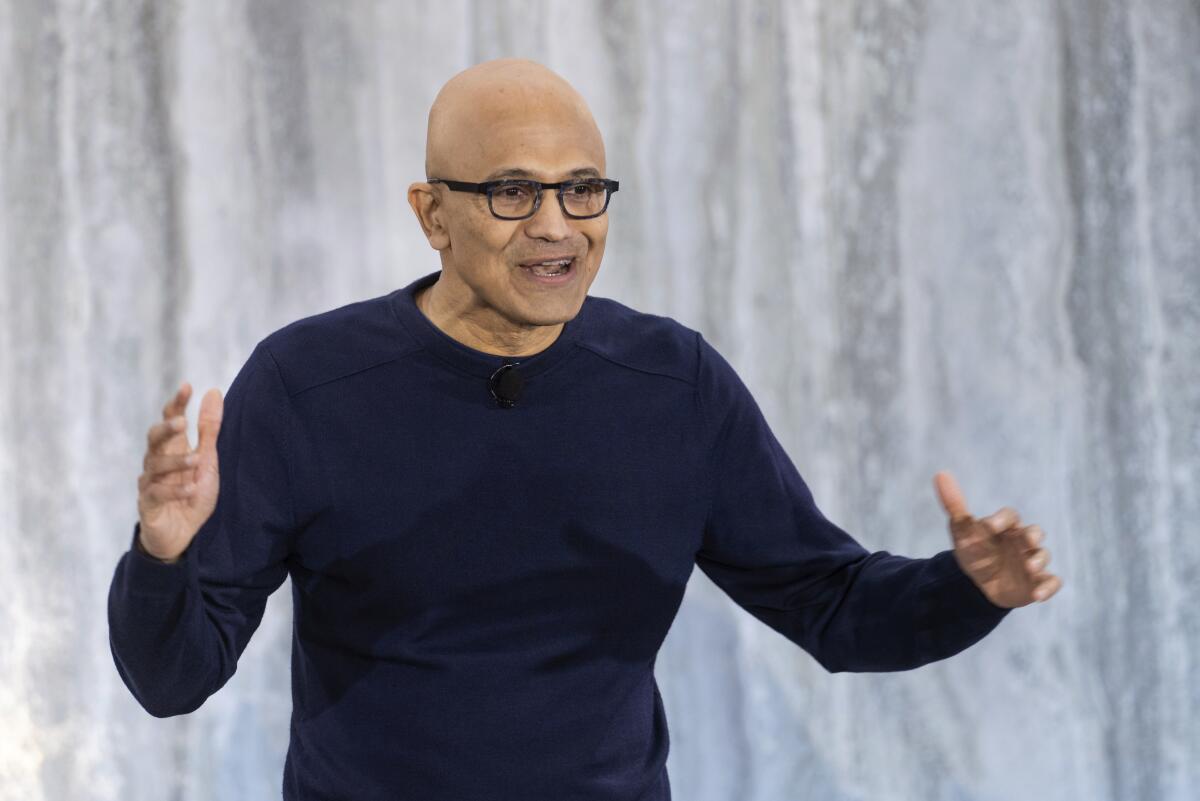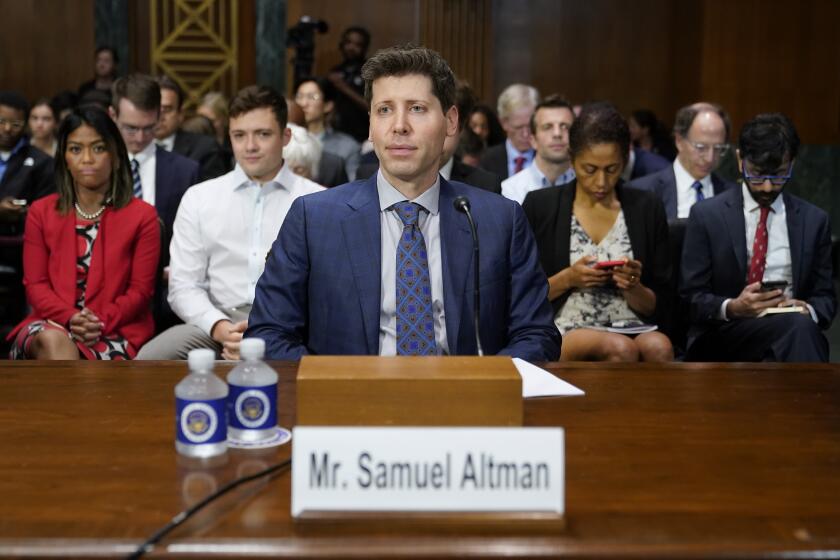With OpenAI in chaos, the tech recruiting feeding frenzy is on

- Share via
For OpenAI, which has become the face of the booming AI industry thanks to popular consumer products such as ChatGPT and DALL-E, the last few days have been a crisis with no clear end in sight.
But for competitors in the frothy AI sector, it’s an opportunity.
More than 700 employees at the artificial intelligence powerhouse OpenAI threatened on Monday to leave the software developer unless its board members — who late last week abruptly fired Chief Executive Sam Altman — resign and reinstate the ex-CEO.
“Any experienced recruiter will know, anytime there’s a layoff announced, anytime there’s this type of shift or dramatic change, the first thing you do is you start the conversation,” said Andrew Esguerra, a managing director for the recruiting agency Coda Search. “You try to get there first.”
Esguerra has already started reaching out to OpenAI employees to see if they’re looking for new work, he said, and he’s almost certainly not alone: “Every single one of these OpenAI [employees], specifically the engineers … I wouldn’t be surprised if each one has been already engaged by 100, 200, 300 people.”
The hottest startup in Silicon Valley is in flames. So is the fiction that anything other than the profit motive is going to govern how AI gets developed and deployed.
It’s not immediately obvious that rival AI firms would be the biggest beneficiaries of an exodus. The 700-plus OpenAI employees who signed a letter Monday threatening to jump ship said they would head to Microsoft, where Altman landed after being dismissed.
The Redmond, Wash.-based tech giant, which has invested in and worked closely with OpenAI, “assured us there are positions for all OpenAI employees,” the signatories said.
Altman tweeted Monday: “We are all going to work together some way or other.”
He may also, according to some reports, return to OpenAI as part of a transitional board or even as CEO.
Even if Altman were to return in some capacity, many OpenAI employees could question the stability of the company in the future. And that could give other AI firms a chance to make them better offers. With most of OpenAI’s 770 employees seemingly up for grabs, competitors big and small could snap up some of the all-too-valuable human capital that makes the tech world turn.
Sam Altman, one of the most prominent figures in artificial intelligence, is leaving OpenAI with the company’s board saying that it had lost confidence in him as a leader.
“Salesforce and Slack and Tableau will ALL match any OpenAI researcher who has tendered their resignation full cash & equity OTE to immediately join our Salesforce Einstein Trusted AI research teams,” Salesforce Inc. CEO Marc Benioff tweeted on Monday. “Join our Trusted AI Enterprise Revolution.”
Google’s DeepMind saw a surge of inbound OpenAI resumes after Altman’s departure, The Information reported Sunday, while smaller AI players moved to proactively recruit OpenAI staff.
Esguerra, the recruiting agency employee, said he hasn’t yet seen LinkedIn flooded with job seekers — the situation is still very much in flux, he emphasized, and many employees want to fix OpenAI rather than give up on it — but he’s already seen “a few responses here and there.”
“They’re gonna lose people for sure,” he said. “People are already looking elsewhere. People are now opening up their ears to what recruiters have to say: what projects are out there, what kind of work they could be doing elsewhere.”
Many of OpenAI’s biggest competitors in the artificial intelligence sector — including Amazon, Anthropic, Apple, Google, Hugging Face, IBM, Meta, Midjourney, Runway and xAI — declined or did not respond to a request for comment as to whether they’ve tried to recruit, or been approached by, disgruntled OpenAI staffers.
Microsoft has hired Sam Altman and another architect of OpenAI after they unexpectedly departed the ChatGPT maker days earlier in a corporate shake-up.
“The AI research lab within Microsoft has lagged its peers in foundation model development to date … and will not instantly become as effective as OpenAI with an infusion of talent,” said Brendan Burke, senior analyst for emerging technology research at the market research firm PitchBook, in an email. “Competitors have a window to pursue foundational breakthroughs that can surpass the Microsoft-OpenAI efforts.”
A report published by PitchBook on Friday found that $23.2 billion in funding had been committed to generative AI startups this year through mid-October — although that number was a relatively less impressive $7.9 billion when outlier corporate partnerships were excluded from the total.
The exact circumstances under which Altman was let go by OpenAI remain unclear, but it’s believed that his dismissal stemmed from disagreements over the speed and safety with which the developer should work on AI. Although OpenAI has some for-profit components, it is ultimately run by a nonprofit board that aims to develop AI safely and with humankind’s best interests at heart.
In a statement, OpenAI‘s board attributed Altman’s firing to a lack of consistent candor in his communications with board members. The board has since made former Twitch CEO Emmett Shear OpenAI’s interim CEO.
Tech companies are known for pulling out all the stops in a race to hire talented developers and other staff before their competitors. It’s a culture that gave rise to the image of tech offices as lush, collegiate campuses filled with pingpong tables, on-site amenities and perks galore. When a tech startup gets acquired, it sometimes has less to do with the product the company has built than the staff it has assembled — a tactic known as an “acquihire.”
OpenAI did not respond to a request for comment about whether it’s had trouble retaining staff since Altman was fired, or how it plans to respond to the employee letter.
Alluding to ChatGPT’s ability to help job seekers streamline the application process, Esguerra said: “I’m sure everyone [at OpenAI], they used the software they built to make their own resumes over the weekend.”
More to Read
Inside the business of entertainment
The Wide Shot brings you news, analysis and insights on everything from streaming wars to production — and what it all means for the future.
You may occasionally receive promotional content from the Los Angeles Times.














